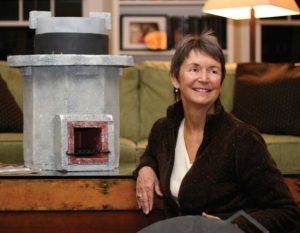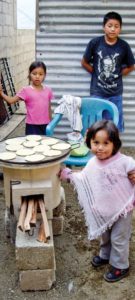
Our local hero, Nancy Hughes, had an epiphany in Guatemala. In 2004, while volunteering as a cook for a medical team there, she saw countless victims of severe burns and respiratory illnesses caused by the indoor cooking fires common in poor households. She saw kids with hands burned so badly their wrists grew backward to touch their arms. She saw babies who couldn’t breathe because of inhaling too much indoor smoke. She saw these horrors and thought, “Well, this is stupid.”
In 2008, Hughes, 66, an East Fork resident, founded StoveTeam International, a nonprofit group that supplies fuel-efficient—and nearly smoke-free—stoves to Central American countries. The organization has supplied more than 6,000 Ecocina stoves to people in Guatemala and El Salvador and is building three new factories in Honduras and Nicaragua to meet growing demand. Hughes’ dream is to deliver the stoves worldwide, starting with Latin America.
“With just a bit more money, we can change Central America,” she said.
For those accustomed to cooking over open fires in small, enclosed rooms, the Ecocina is a sea change. Hughes often sees foot-long icicles of creosote—the black residue that builds up in chimneys—hanging inside Central American homes. One woman told her the new smokeless stove was a miracle. Another demanded one on the spot.
“The woman told me, ‘It’s almost Christmas, and I need it right away because I need to cook my chicken on it,’” Hughes recalled.
 When she returned from Guatemala in 2004, Hughes met two stove designers in Eugene, Oregon, where she lives part-time. The designers, Larry Winiarski and Ken Goyer, told her they would design a fuel-efficient stove if she would help establish a factory to produce them. Soon after, she was in El Salvador watching the newly designed Ecocina boil a liter of water in fewer than eight minutes using no more than two or three small sticks as fuel.
When she returned from Guatemala in 2004, Hughes met two stove designers in Eugene, Oregon, where she lives part-time. The designers, Larry Winiarski and Ken Goyer, told her they would design a fuel-efficient stove if she would help establish a factory to produce them. Soon after, she was in El Salvador watching the newly designed Ecocina boil a liter of water in fewer than eight minutes using no more than two or three small sticks as fuel.
At fifty pounds, the Ecocina is lightweight compared with traditional stoves. Latin American women can transport them to sell fresh food roadside. The design emits 70 percent less carbon and particulate matter than most stoves and is insulated to keep the exterior cool to the touch.
StoveTeam factories provide jobs for local workers to build stoves from locally harvested, biodegradable materials. In turn, the stoves provide jobs for women and, because they are so fuel-efficient, cut back on deforestation.
“The project totally changed my life. I’ve said to people, ‘Anybody can do what I’ve done,’” Hughes said. “You have to have a passion.”
The Wood River Rotary clubs support StoveTeam, and Hughes hopes the support will continue as she expands her operations.

